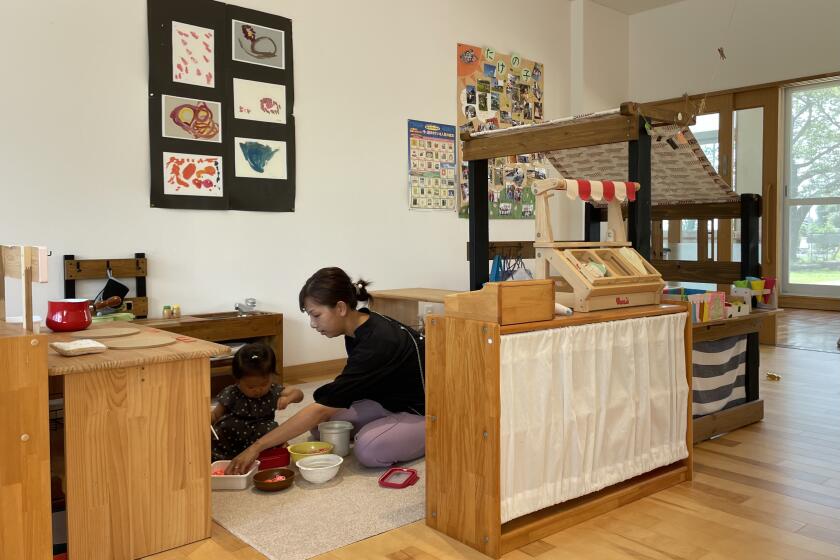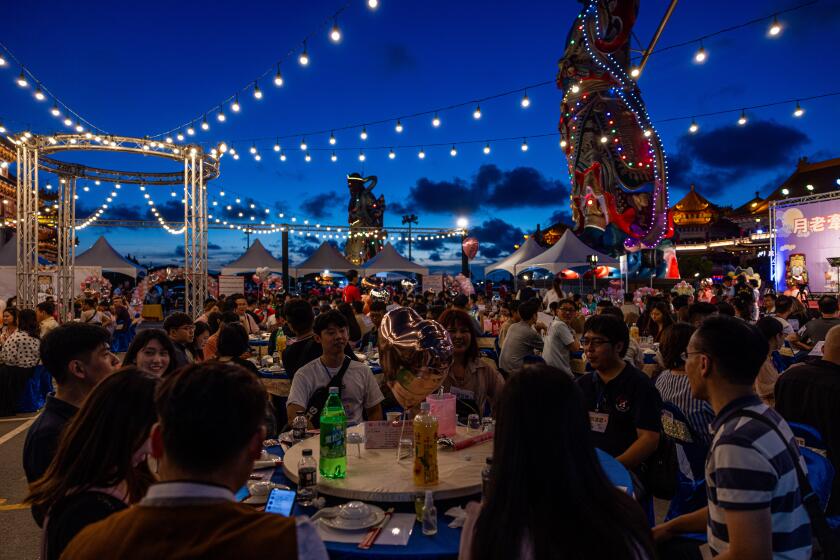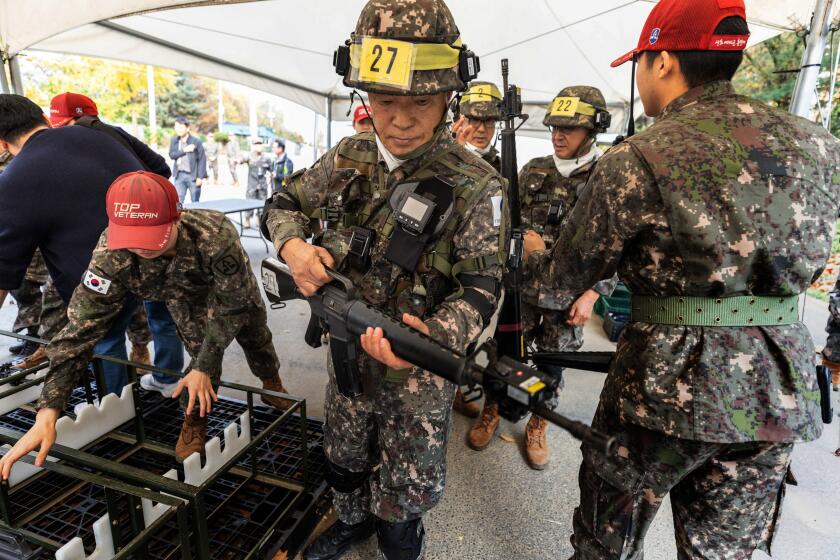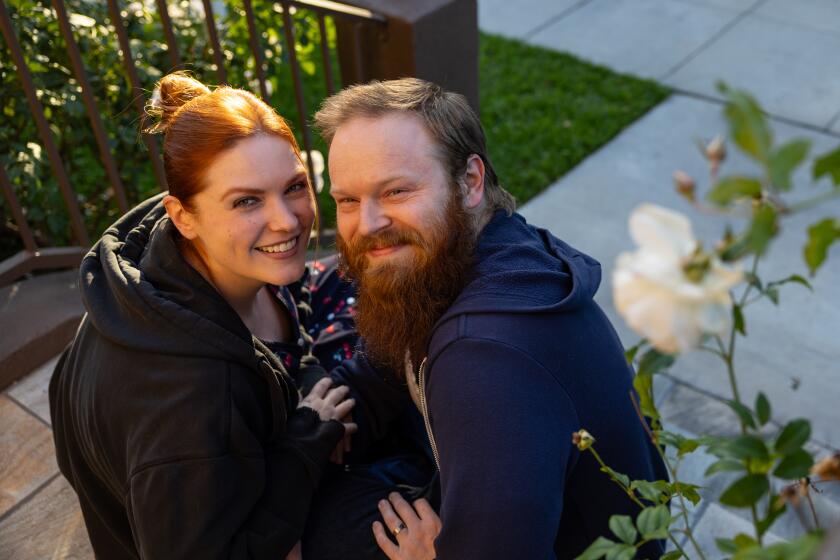
- Share via
GANGHWA ISLAND, South Korea — Three monks, a horde of reporters and 20 singles looking for love walked into a Buddhist temple.
The singles sat on gray mats in the center of the temple’s study hall, visibly tense because the two dozen reporters crammed in the back were causing a small scene.
An irritated cameraman snapped at a competitor: “Can you get out of my shot?”
The three monks of the Jogye order — South Korea’s largest Buddhist sect, with around 12 million followers — looked on with placid smiles.
So began the third edition of “Naneun Jeollo” — or “To the temple” — a matchmaking event launched last year by the Korean Buddhist Foundation for Social Welfare to fulfill the religion’s commitment to fostering “social cohesion.”
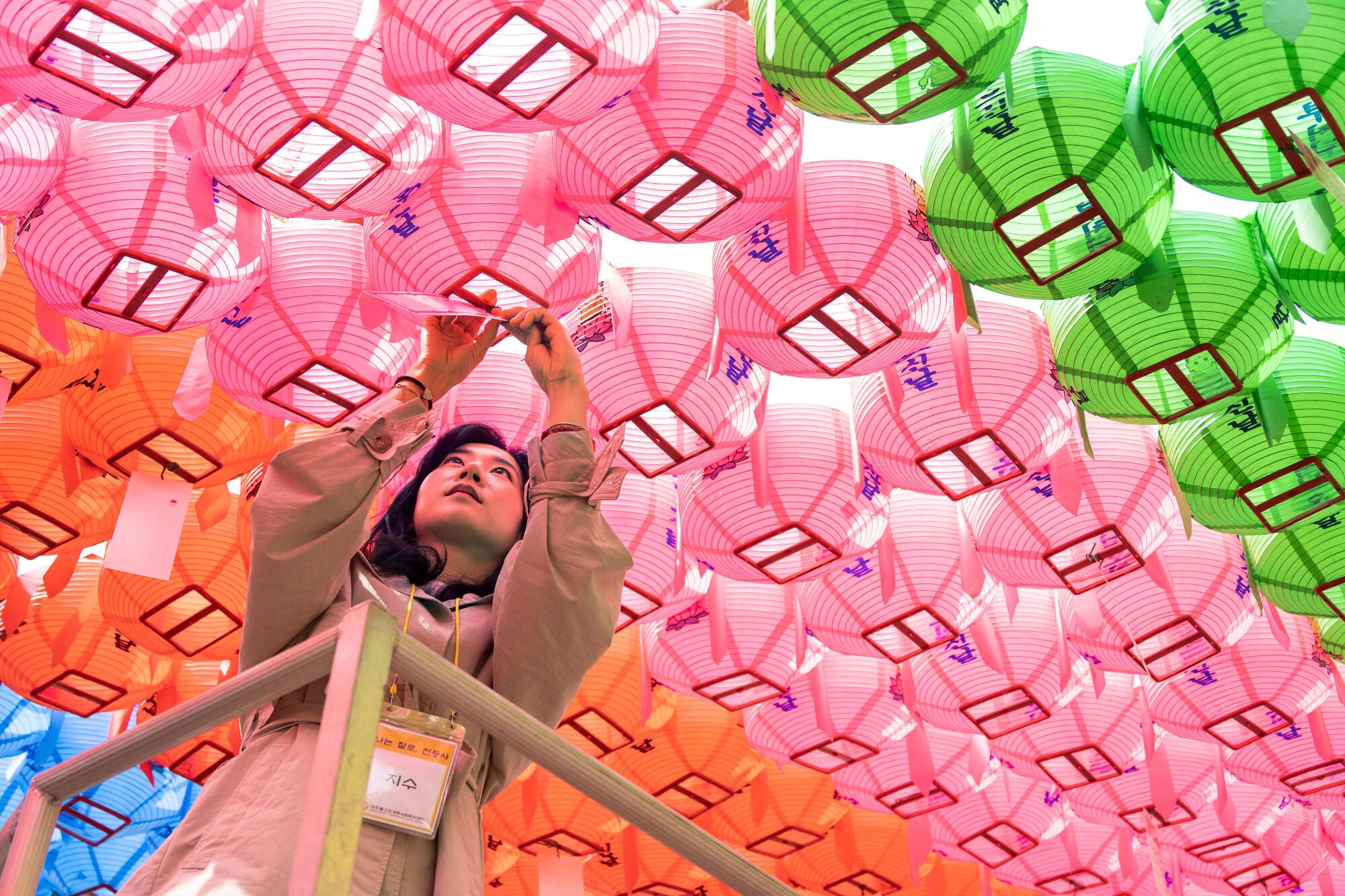
One of the organizers reminded the participants of the weekend’s stakes: nothing less than the future of the country.
“I’m sure all of you have noticed how that day-care center in your neighborhood has one day turned into a nursing home,” he said, pulling up a computer slideshow titled “Aging Society.”
Japan is confronting a depopulation crisis because of a precipitously falling birth rate, but one mountain town has bucked the trend — spectacularly.
It showed that over the last two decades the number of babies born each year had been halved and that by 2050 the elderly would make up roughly 40% of the total population, straining the country’s welfare systems and deepening labor shortages.
The singles took in the figures with polite yet stony expressions.
“For the sake of the low birthrate,“ the presenter concluded in an upbeat tone, “all you have to do today is actively participate and find a good partner.”
: :
The Buddhists modeled the weekend after a matchmaking reality TV series called “I Am Solo,” which has produced eight marriages and gained a nationwide following.
This — along with the unusual premise of celibate ascetics taking on the challenge of worldly romance — has given the Buddhist version its own viral fame, which the foundation hoped to maximize by opening it to the press.
“We want to spread the word,” said Myo-jang, the monk who leads the foundation. “We’re hoping one day there will be an edition for every Buddhist temple in the country.”
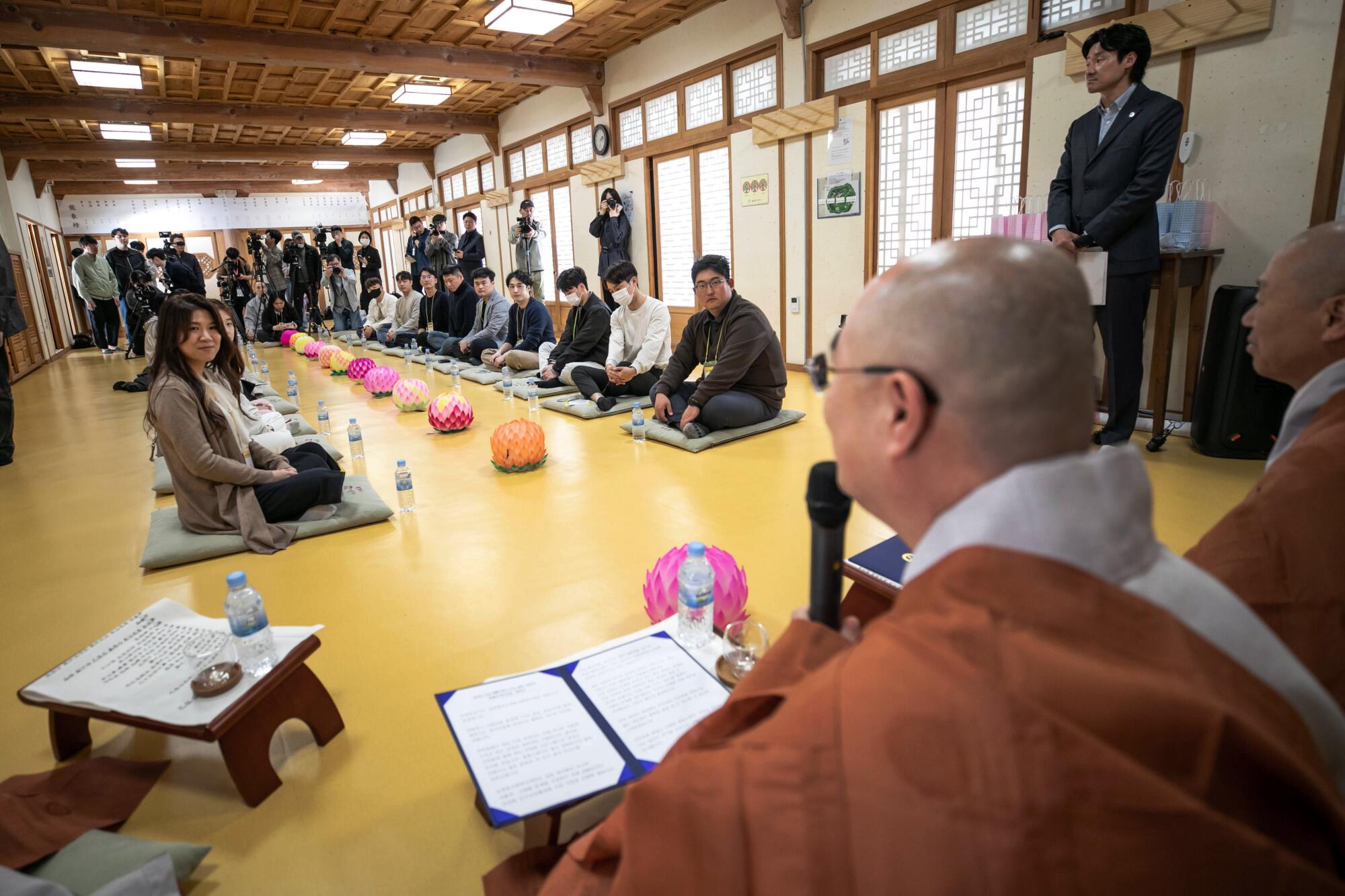
The participants — 10 men and 10 women — had been told to expect some media, but not the film set’s worth of cameras that followed them into a courtyard for formal introductions.
“My mind is going blank,” said one of them, a 30-year-old who works in finance. “I thought there would be at most one TV crew. I feel like someone who just committed a huge crime.”
The name on his badge — “Seong-hun” — was a pseudonym drawn from a pile, just like on the TV show.
He was one of 147 men and 190 women who had applied to participate in the April weekend, held at Jeondeung Temple, the oldest Buddhist monastery in the country.
Alarmed by a plummeting birthrate, Taiwan’s government has set out to help young people meet, marry and have children. But success is elusive.
“We screen the participants very carefully,” Myo-jang said. “We want to make sure that there aren’t people looking for one-off flings.”
The weekend was free and open to all religions. Applicants were required to submit employment records and a personal essay, and age and geography were taken into account to maximize the chances of long-term coupling. But Myo-jang said one factor was the most important: yearning.
Only those who hungered for true love, like Seong-hun, had made the cut. Since his last serious relationship in college, Seong-hun had discovered finding love to be difficult. He disliked dating apps, and large social gatherings sapped him. His mother had been telling him to take dating lessons.
At some point in the relentless struggle to find financial stability, life had begun to feel like a perpetually half-full glass “that just wouldn’t fill up all the way.”
“I’ve gotten too cautious in my 30s,” he said. “When I was younger, pure attraction was all I needed, but now, I find myself getting hung up on little doubts way too early in the relationship.”
What exactly he was looking for, he didn’t know.
“I think what I’m drawn to is someone who’s tough on the outside, but soft on the inside,” he said.
: :
After the singles had changed into their uniforms — a traditional Buddhist garment consisting of a magenta vest and wide-fitting navy pants — Shim Mok-min, the professional emcee hired for the event, gathered them around him.
Shim, who was dressed in a baby blue suit, estimated he had done about 50 events like this one. Most of them were hosted by local governments as part of a national effort to bring the country’s nosediving fertility rate — the number of children the average woman has over her lifetime — closer to the 2.1 needed to maintain a stable population.
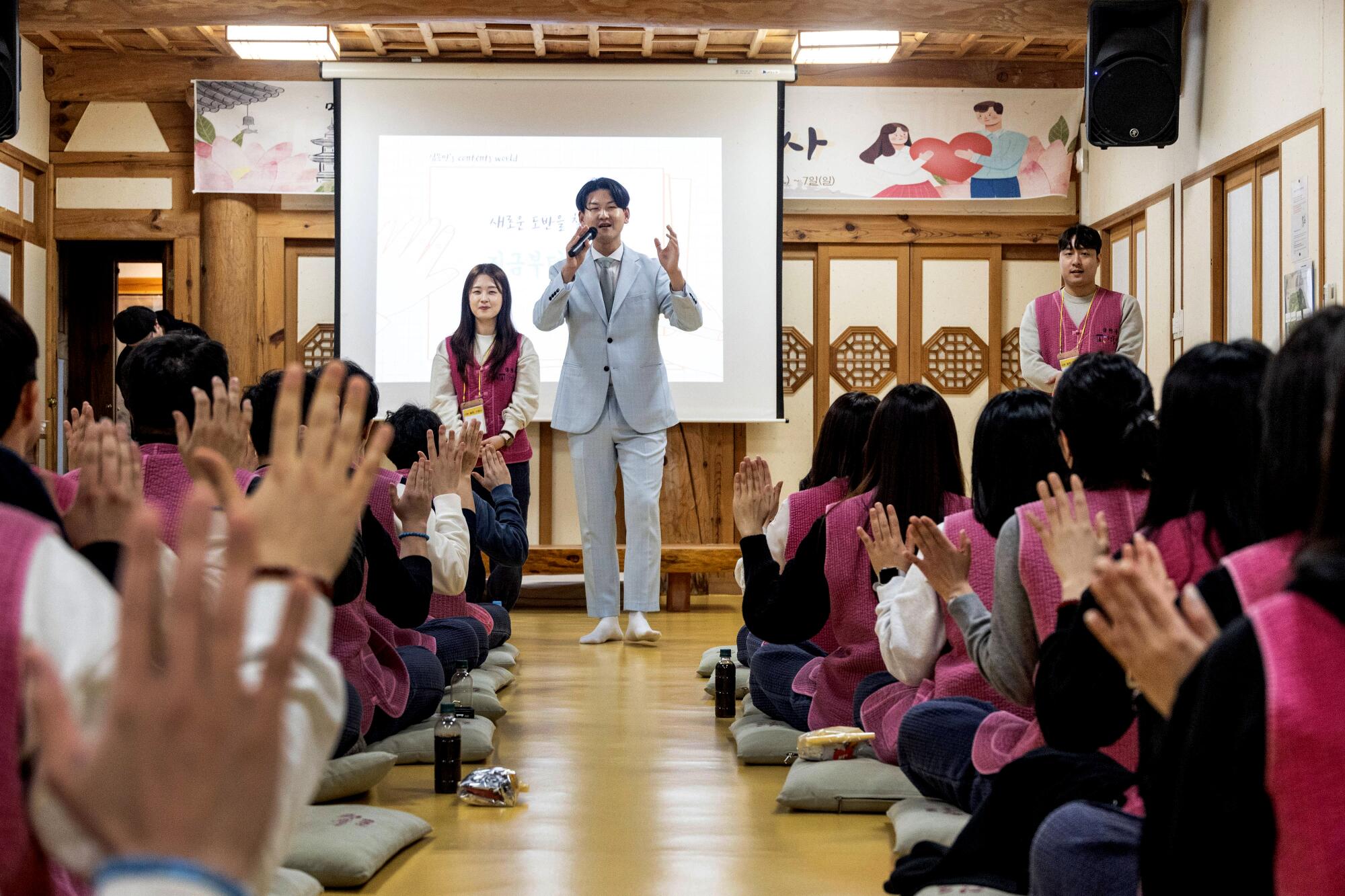
The soaring cost of homeownership, poor work-life balance and the fracturing of traditional gender roles have continued to push South Koreans away from marriage and reproduction.
More than half of those between the ages of 30 and 34 are unmarried, and last year, the country’s fertility rate — already the world’s lowest — fell to 0.72.
Some of the matchmaking events Shim hosted had storybook endings, like one held by the city of Yongin that produced a marriage. The mayor officiated the couple’s wedding, and Shim emceed their child’s first birthday party.
But far more often, they ended up turning into a game of survival.
“I’ve seen the women being swapped out with each new group while the men stay the same, round after round,” Shim said. “One event I did had two women and 18 men.”
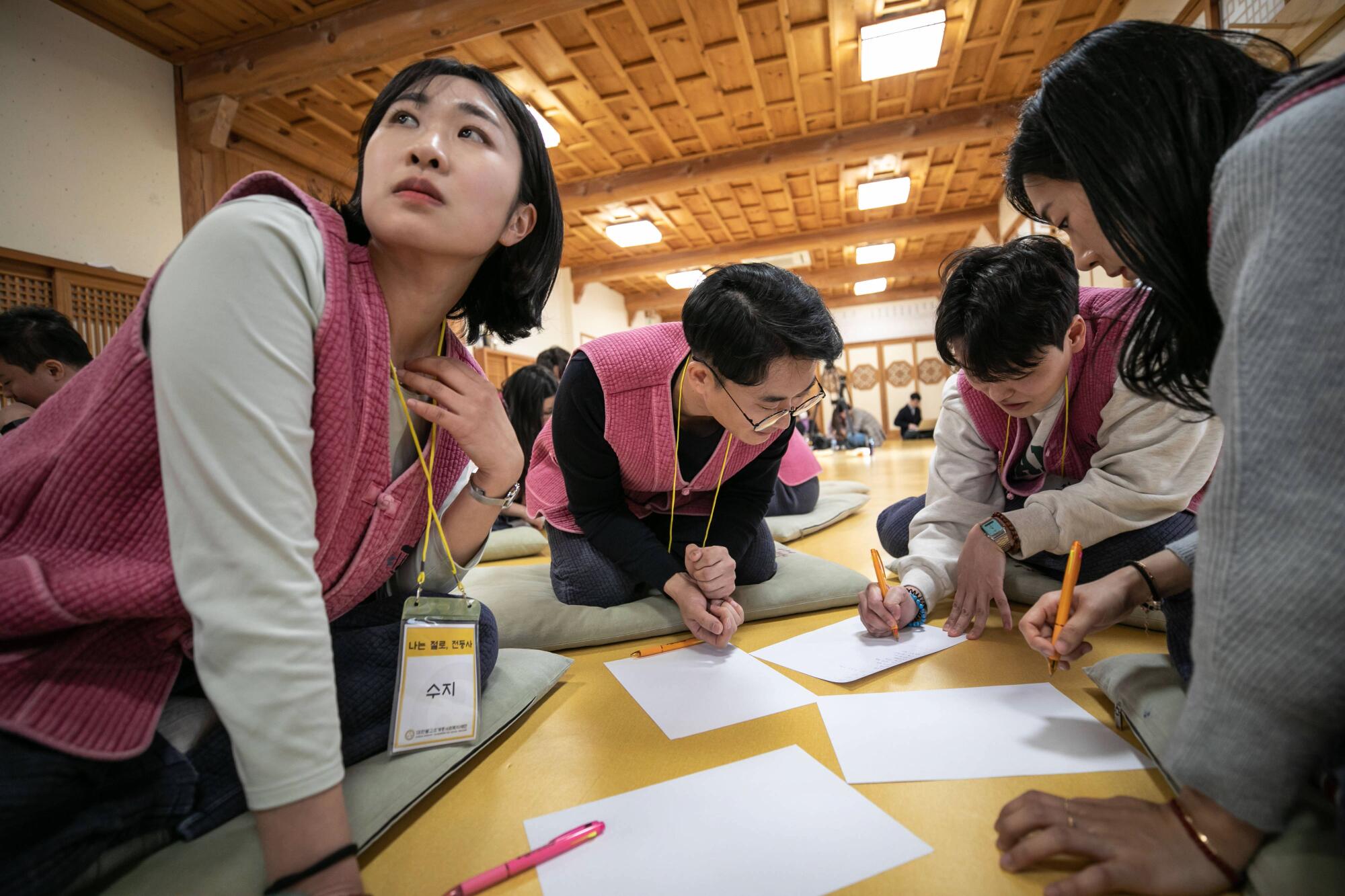
The games he was now moderating were icebreakers designed to tease out any early attractions and encourage small acts of physical contact.
“At events where everyone is new to this format, you have to push them a bit,” he said. “The ultimate goal is to direct traffic so that participants have clear paths they can pursue later on.”
Shim had the singles take turns answering questions from the rest of the group.
“Your hair is so nice,” one of the men told Ji-su, a 33-year-old police officer. “What do you use on it?”
Ji-su cracked a smile and mumbled an answer.
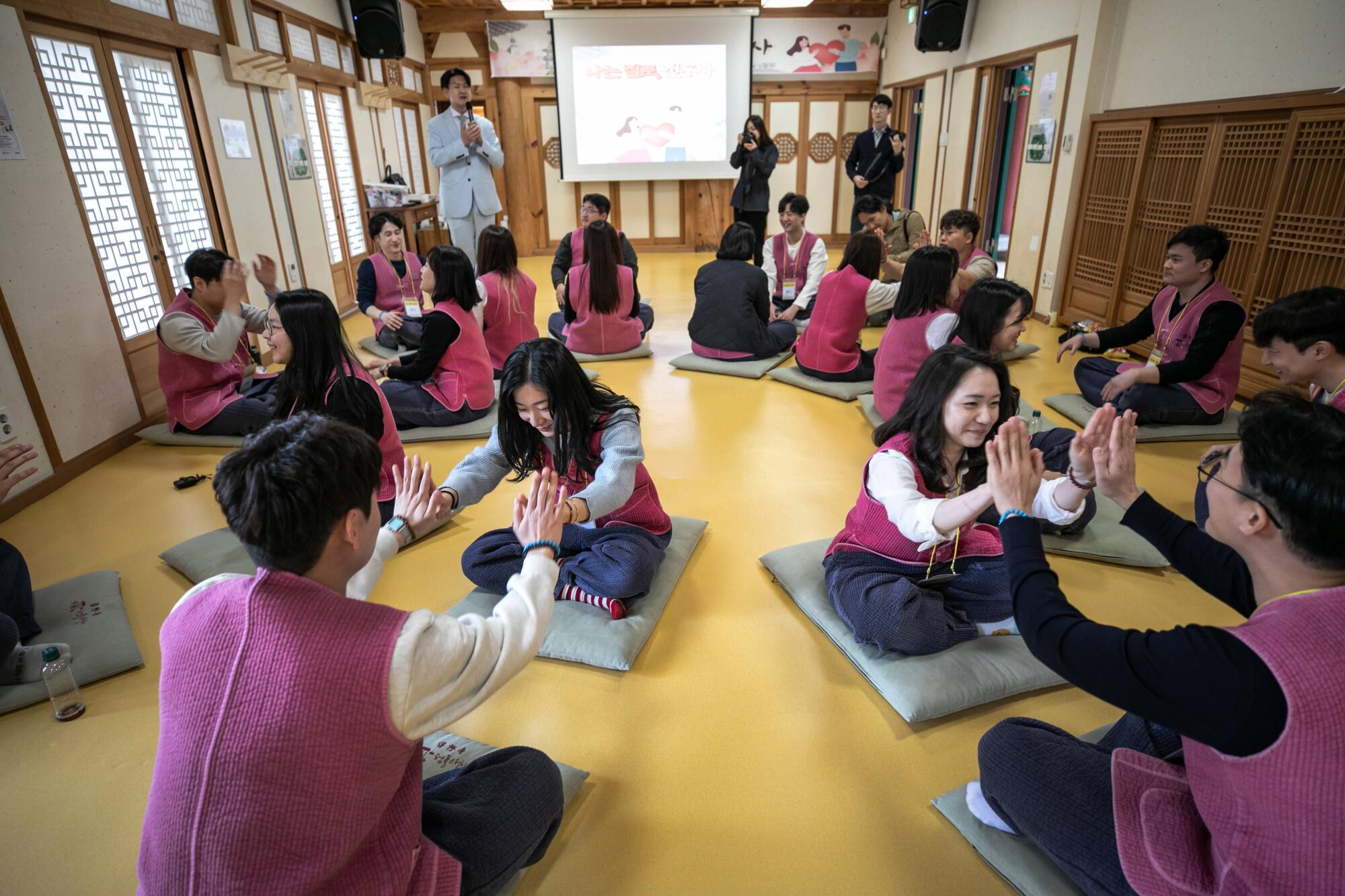
By the time the group moved on to team bingo, any initial shyness had been replaced by a total commitment to winning. With every point scored, the singles screamed and high-fived one another.
Shim frantically reminded them why they were here.
“You are here to find your other half,” he said. “The games are just a means to an end!”
A round of speed dating, in which the men and women took turns having short conversations with each other, wrapped things up.
With South Korea’s birthrate plummeting, veterans in their 60s and 70s say they can bolster the army’s ranks. But can they keep up with the young?
For dinner at the temple cafeteria, the singles would split off into pairs. The women with the highest game scores were given first pick, and a program organizer led them outside, one after another, to a laptop displaying head shots of the men.
“That was tiring but fun,” said Seon-jae, who was picked fifth by a 31-year-old dental hygienist.
He didn’t know if he liked her back yet.
“I guess I’ll have to talk to her and find out,” he said.
: :
After dinner, the group convened for one more round of games.
Shim turned down the mood, leading the group in a meditative chant, instructing the singles to hold hands and gaze into each other’s eyes.
“Empty your minds,” Shim said.
Knees were now being touched, whispers shared and heads drawn together.
“Bring your mats closer together,” Shim said.
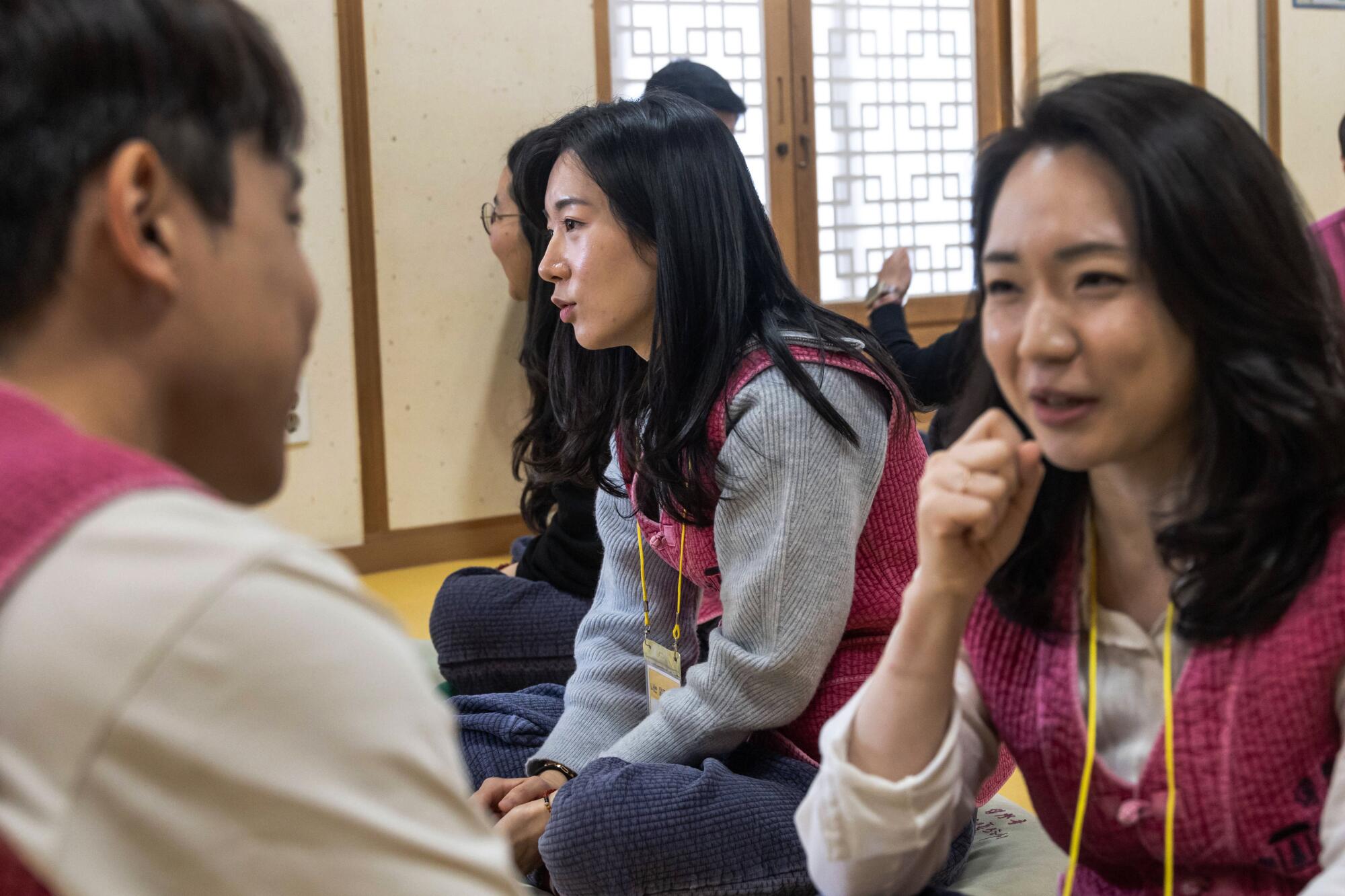
Seong-hun talked animatedly with Yu-jin, a 33-year-old real estate consultant whose sister had met her husband at a Buddhist temple.
Ji-su, the police officer, was in a quiet conversation with her partner looking charmed, until one of the reporters walked over and stuck his camera about a foot from her face, making her recoil.
For the evening’s final act, everyone took a short walk to the teahouse for a romantic cafe outing, but with rotating partners. After a few hours of conversation under the soft yellow lights, couples would choose their dates for the next morning’s nature walk.
“The participants will text us who they like the most later tonight,” said Kong Ji-yu, one of the organizers. “If there’s a match, the two will be paired together for the walk. For the rest, we’ll partner them with someone we feel suits them.”
Last year’s event had produced two matches, with one of the couples reportedly still dating. The organizers, observing the proceedings from the lobby, were now hoping for three.
Birth rates have been trending downward in the U.S. for several decades and dropped precipitously during the pandemic. A key reason is the high cost of raising kids.
The singles sipped fruit tea at the wooden tables, looking relaxed and sleepy. Camera-wielding reporters zipped through the narrow aisles like bees, zooming in on faces and hands.
After a few rotations, Yu-jin, the real estate consultant, went to the counter to refill her lemon tea, looking up to see a reporter in a long trench coat pointing his handheld camera at her.
The reporter, who was filming a news documentary for national broadcaster KBS, fed her a line.
“Say ‘I want to meet a good partner through this program,’” the reporter said. “Just once, really quickly.”
Yu-jin reluctantly obliged.
: :
Seong-hun went to bed early that night feeling contemplative.
Here he was trying to escape the casualness of dating apps, only to feel like he was cheating every time his conversation partner changed.
“I realized I need to start by figuring out what exactly I’m looking for,” he said. “Maybe I’ve just been overcomplicating things in my head.”
The next morning at the courtyard, Kong, the program organizer, looked pleased.
“There were four matches last night,” she announced.
To avoid hurt feelings, she added, the details of who picked whom wouldn’t be revealed to the group.
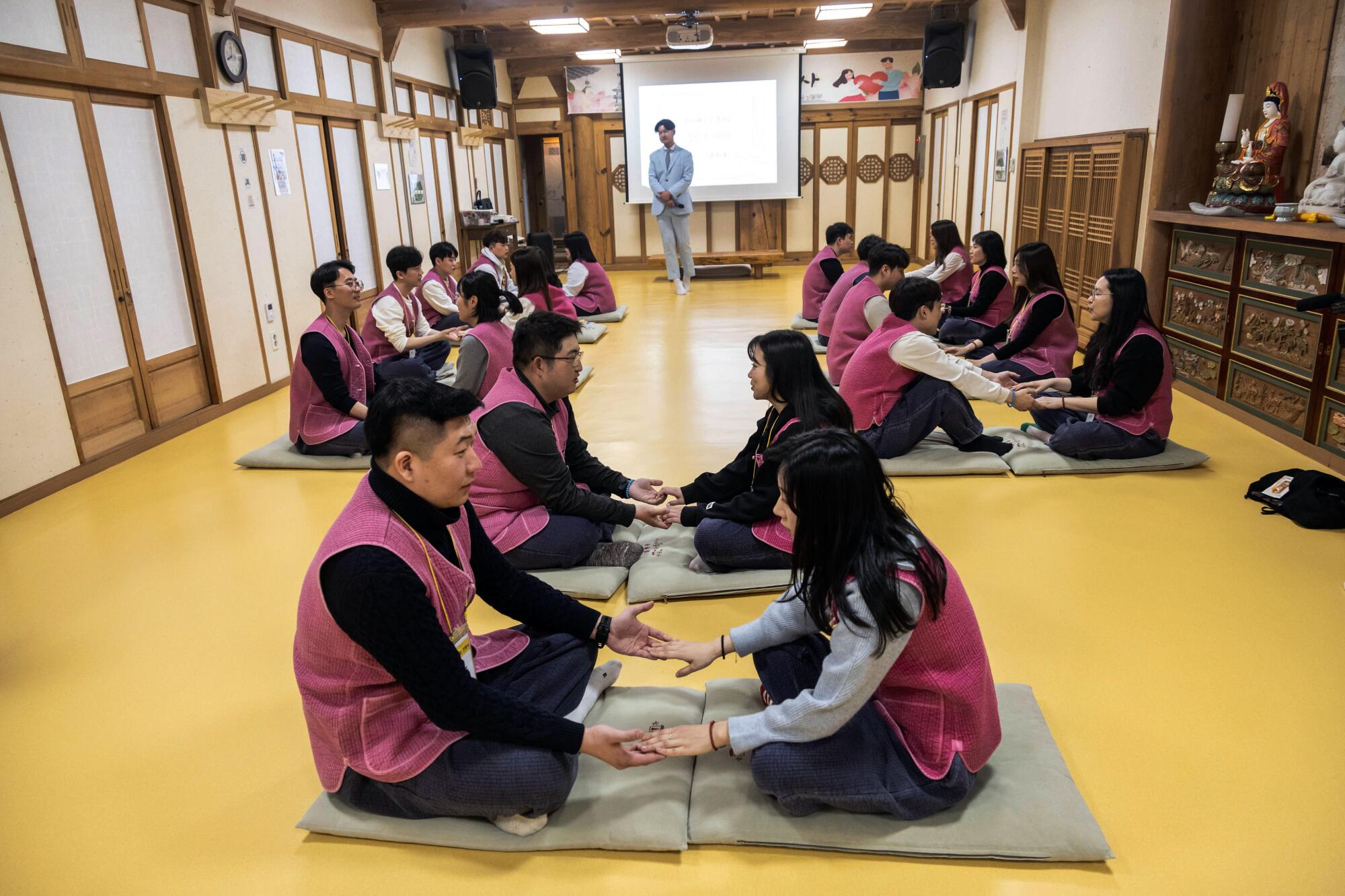
Seong-hun had asked the organizers to pair him with someone at random. He sat with his assigned date at one of the tables outside the cafe and dived into a conversation about life’s malaise, while a camera drone buzzed overhead capturing the strolling couples posing for photographs by the cherry blossoms.
Huddled together a few tables over with an air of weariness was a group of four calling themselves “the failed couples.” They had dropped any pretense of romance and skipped the walk.
What’s more, the participants were fed up with the reporters from KBS. “One of them tricked me into an interview by asking me to ‘just sit down for a second,’” said Chae-won, a 32-year-old gym teacher.
Would events such as these — and their steady contribution of new couples — help reverse South Korea’s fertility crisis? The group was skeptical.
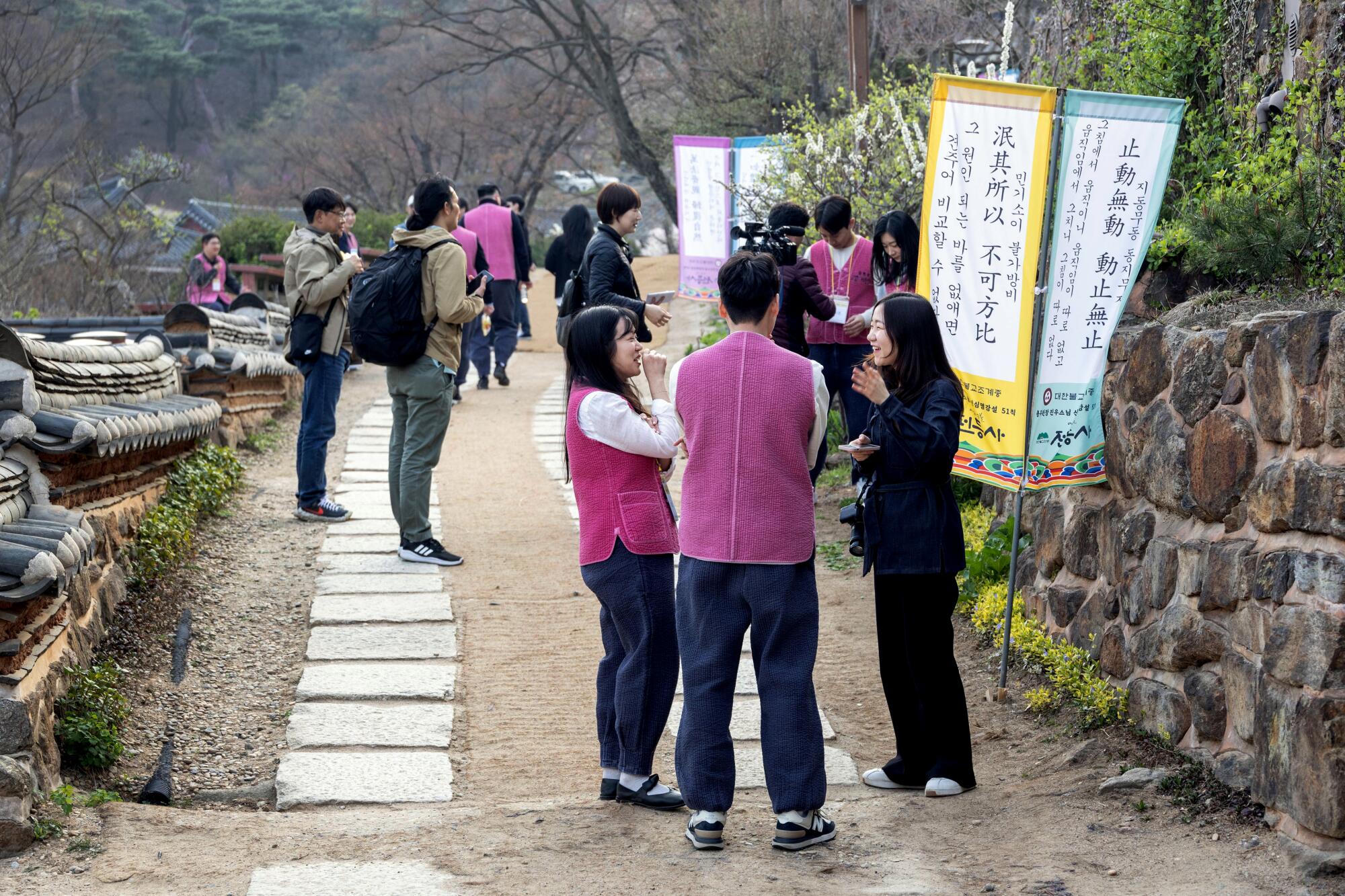
“What really needs to be addressed is the cost of living and housing prices,” Chae-won said, as the rest of the group nodded along. “Right now, I already have my hands full just from looking after myself.”
Even if she ended up getting married, she would think twice before having a baby.
“I see colleagues getting the stink eye for having to take a day off because of their child,” she said. “Things have supposedly gotten a lot better in that regard, but that’s still how it goes.”
Later, the matched couples would be encouraged to pursue their relationship beyond the temple walls, under their real names.
And at the closing ceremony, Yeo-am, the temple’s abbot, offered some parting words of wisdom.
Relationships, he said, were made not from a burning love but quietly accruing affection.
“My sense is that there are another three or so potential couples in this group,” he said, pointing to the two singles nearest to him. “Why don’t you two try seeing each other?”
The two laughed awkwardly.
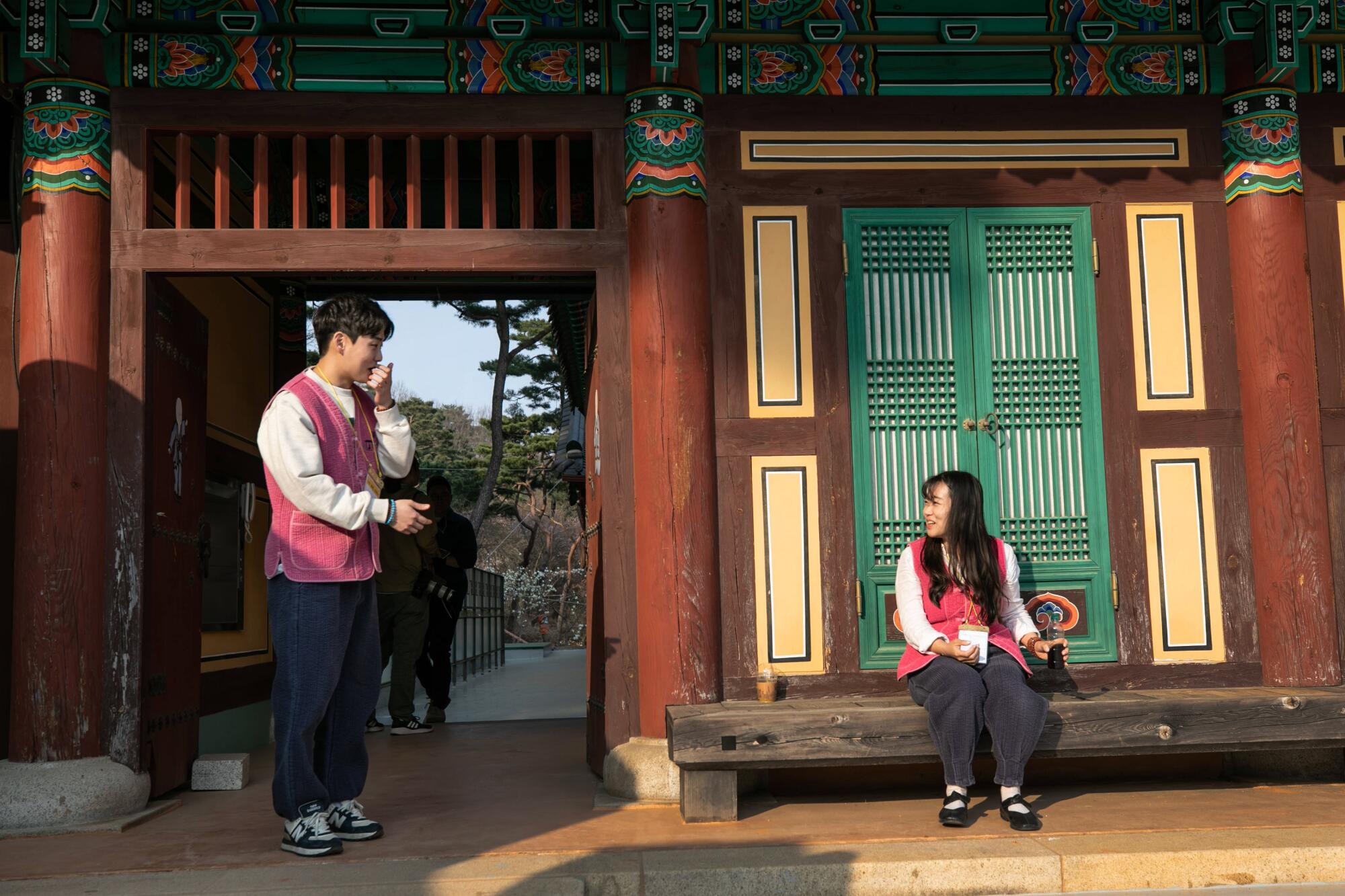
When the abbot began taking questions, Seong-hun raised his hand.
“How do I get rid of this emptiness, this feeling that I’m missing something important in life?” he asked.
The abbot told him to begin every morning by performing exactly 108 bows, a meditation exercise in Korean Buddhism. And for all the weekend’s emphasis on finding a partner, the abbot’s advice was a reminder that some journeys in life must be made alone.
“That’s something you must resolve on your own,” the abbot said. “No other person can save you from it.”
More to Read
Sign up for Essential California
The most important California stories and recommendations in your inbox every morning.
You may occasionally receive promotional content from the Los Angeles Times.
